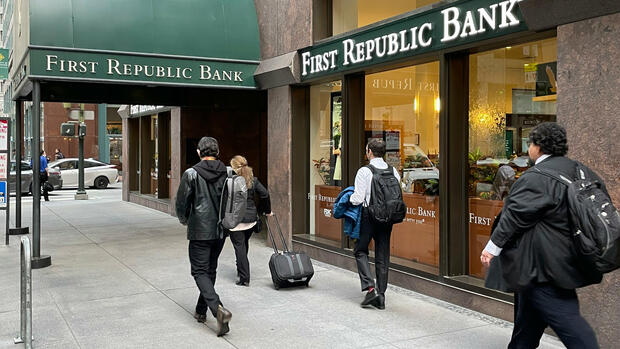The regional bank was sold to the major bank JP Morgan.
(Photo: dpa)
Denver After the bankruptcy of the First Republic Bank on Monday, a debate broke out in the USA about the future of deposit insurance. The deposit insurance fund FDIC, which is also a key bank regulator, has now pushed forward with a proposal: In the future, company accounts should be insured significantly higher than the current upper limit of $250,000 per bank, which currently applies to both individuals and companies. That’s according to an analysis released by the FDIC on Monday.
A reform of deposit insurance is urgently needed, emphasized FDIC boss Martin Gruenberg. His authority was at the center of bank failures. The exit of Silicon Valley Bank (SVB) and Signature Bank in March cost the FDIC a good $20 billion. The First Republic’s bankruptcy and subsequent emergency sale to JP Morgan Chase could cost another $13 billion as the FDIC absorbs some of the losses.
The focus of the discussions is on the short message service Twitter and other social media as well as the spread of mobile banking. These developments have resulted in the SVB’s failure becoming the first digital bankrun in US history.
Customers had also withdrawn their funds at record speed from Signature Bank and the First Republic and parked them at major banks such as JP Morgan and Bank of America. Wall Street houses are considered more robust and better regulated, and customers are betting that the US government will bail out the big banks when in doubt.
The regulators would have to adapt to these new circumstances, was also the conclusion of the Federal Reserve, which published a report last week on the errors surrounding the bankruptcy of the SVB.
New law needed by Congress
FDIC boss Gruenberg believes that a higher guarantee for company deposits is the best solution. He spoke of a so-called “targeted coverage”, with different upper limits for different account types. Business accounts that companies use to pay wages and bills should have priority. These could also be fully guaranteed by the FDIC, says Gruenberg.
Especially the customers of the SVB, which included many start-ups and venture capitalists, had to worry about their money for a weekend. For a long time it was unclear whether the FDIC would guarantee all deposits or just up to $250,000. Because the FDIC had to step in and close the SVB on a Friday morning in March, bills and wages could not be paid on time. The panic then quickly spread to other banks – also because many called on Twitter for customers to withdraw their funds from the SVB.
In order to implement targeted coverage, however, Congress would have to pass a new law.
The Association of Medium-sized US Banks (MBCA) had already brought up a proposal in March, according to which the deposit insurance FDIC should completely guarantee the deposits of medium-sized institutions for two years. This is how smaller institutes should be supported. A nationwide guarantee of all deposits is also being discussed, but this would also require new laws and Republicans have already expressed opposition.
Time is running out. With the partial sale of the First Republic, a solution has been found for the last regional bank, which got into trouble in the wake of the SVB bankruptcy. But the problems in the banking system have not yet been resolved, JP Morgan CEO Jamie Dimon also warned on Monday. A particular focus is on loans for commercial real estate in the USA. There, in view of the rapidly rising key interest rates, there is a risk of large write-downs and payment defaults.
More: Comment – After the crisis is before the crisis
